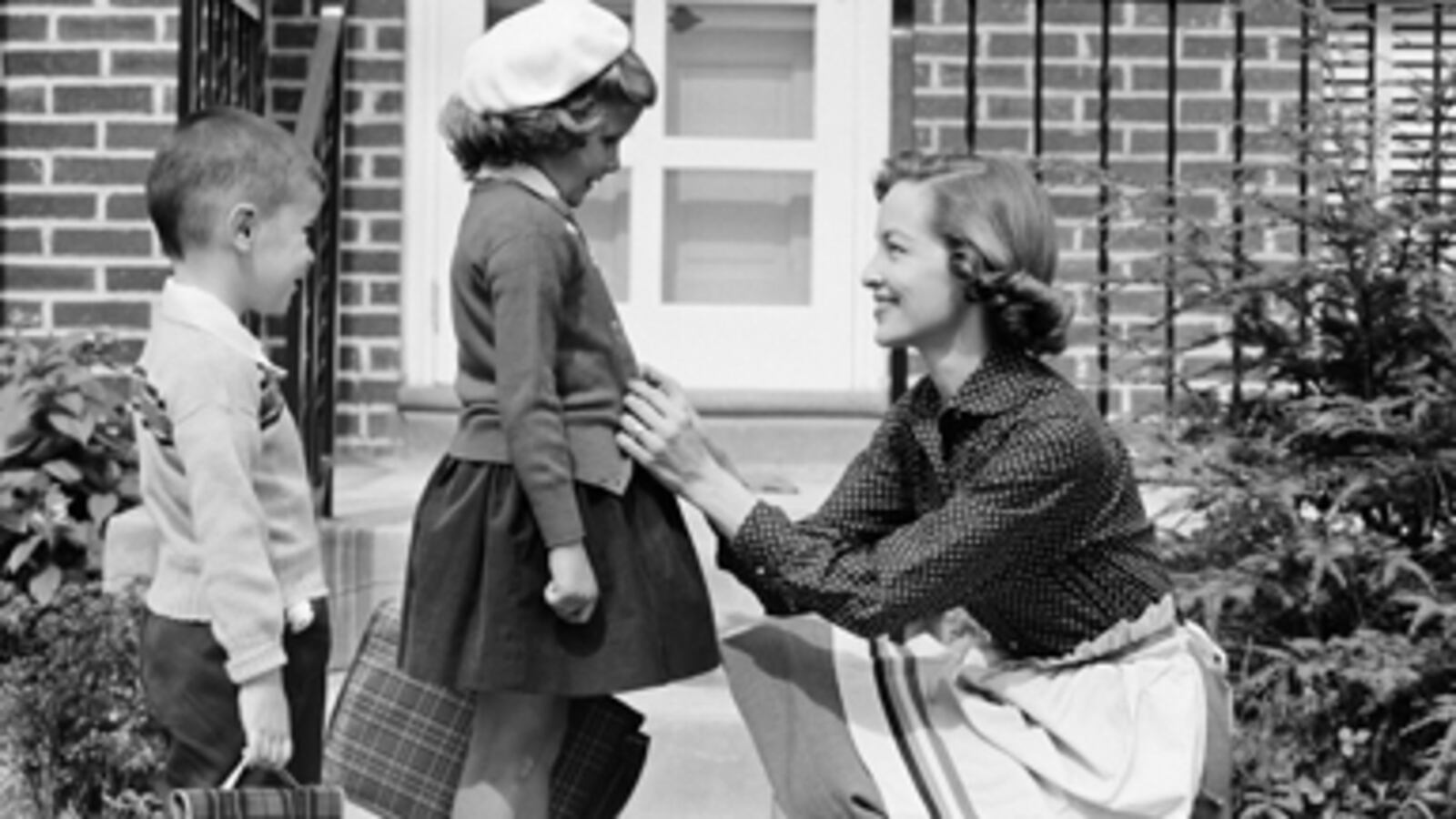Mothers' influence is dead; long live mothers' influence.
This debate about how much mothering matters has probably been going on since two prehistoric mothers sat in a boulder-strewn playground discussing their kids. The one whose child invented the wheel must have swelled with pride while talking about her parenting prowess, while the one whose kid couldn't even build a fire argued that outside influences had more effect. (As for how kids themselves feel about it, that's also a tale as old as time: The successful ones give mom no credit, while angst-ridden misfits tend to blame mom for everything.)
The truth, as usual, lies somewhere in between. But the good news is, research shows that moms can relax a bit—while things like your temperament and availability influence your little ones, not every tiny thing you do impacts how your children turn out.
Gone are the days when experts in child development made sweeping generalizations about how mothers shaped their children's destiny. (" Refrigerator mother" = autism. No.) Now researchers recognize that whether children model themselves on their mother or rebel against her example, whether daughters aspire to a career because mom did or choose a stay-at-home life for the same reason, whether they're scarred by her multiple failed relationships or derive resilience from them—all depends on the child's own temperament.
"Some of our daughters follow us as role models and some of them rebel," says psychologist Florence Kaslow, who practices in Florida (and whose daughter is also a prominent psychologist.) "It depends not only on what the mother does but what attitude she projects about it. She may have a great career, but does she come home tired every night complaining about work? Does she miss every family outing?"
In fact, short of mom drinking herself into a stupor every night while pregnant, virtually nothing she does is completely deterministic—that is, no maternal behavior has the same effect on every child. Take the ubiquitous advice that mom (and dad, but he'll have to wait for Father's Day to get our attention) should reward kids for good behavior. That can indeed affect whether children become delinquents. But it accounts for just 11% of the difference between kids' levels of delinquency. Being firm, consistent, and setting limits — but with love and kindness (that is, authoritative mothering) — also reduces delinquency, accounting for another 11% of the difference, while being authoritarian (dictatorial, controlling) increases delinquency, accounting for 12% of the difference, found a 2009 study.

Even the Mothering 101 advice to let kids learn from their mistakes (you stayed up too late last night? Fine, you can miss the school bus; start walking) doesn't work on every kid. A 2007 study found that about 30 percent of us carry a genetic variant that leaves the brain with few dopamine receptors, which has been linked to an inability to avoid self-destructive behavior and, now, to an inability to learn from our screw-ups.
Counterintuitively, fussy children tend to be most influenced by their mothers, while mellow, sweet, never-fussy ones are the future rebels you need to keep an eye on, finds psychology researcher Jay Belsky of the University of London.
Clinicians see that all the time. "A mother is a different mother to every child she has, depending on that child's temperament and disposition," says psychologist Roni Cohen-Sandler, who is in private practice in Connecticut. But how that temperament, which has at least some genetic basis, is actually expressed "is in turn a function of the environment, which mothers have a huge influence on."
That is true even for something as basic as how a child handles stress. Many new parents swear that this ability to handle stress is innate, since they see it (or, horrified, note its absence) almost as soon as they get a new baby home. Of course genes matter. But so does parenting. In a 2008 study of babies 3, 6, and 12 months old, scientists found that how their little hearts responded to a stressful situation (mom leaving the room) depended in large part on which form of a dopamine receptor gene they had. Babies with the DNA associated with risky behavior did not show a decrease in a measure called vagal tone, which increases heart rate in response to stressful situations, the scientists reported in the journal Child Development. In babies with the form of the gene that was not associated with risky behavior, vagal tone did decrease, which is what you want. So far, so genetic. But by the time the babies were 12 months old, those with the risky gene whose mothers were highly sensitive and caring showed the desired heart response to the stressful situation. (Babies with the risky gene who had insensitive mothers continued to show the ineffective heart response.) Mom's love had slain the pernicious effect of the gene.
No account of mothers' effects on their children would be complete without at least a brief mention of the influences that start before birth. Through " fetal programming", what and how much mom eats while pregnant can affect her children's risk of developing heart disease, diabetes, cancer, and other adult illnesses. The list of those effects has been growing since the late 1990s. One recent curiosity: mom's hip size affects her daughter's risk of breast cancer. Studying the maternity records of 6,370 women, scientists found that wide, round hips in a mother triple her daughter's chance of developing breast cancer. The reason seems to be that sex hormones control the growth of the hip bones; the more sex hormones (primarily estrogens), the wider and rounder the hips. But higher levels of circulating sex hormones during pregnancy also affect embryonic breast tissue in a way that makes cancer more likely decades later, the scientists suggested in a 2008 paper. Daughters are therefore launched down a path that can lead to breast cancer even before they're born—not by their DNA, but by conditions in utero.
Although nothing mom does is guaranteed to produce a particular effect in her children, one very basic influence seems inescapable, for good or for ill. Whether her children feel that she provided an emotional safe haven, being there for her kids in times of distress, strongly shapes a long list of outcomes as diverse as their romantic relationships (no surprise) and how xenophobic they are. In short, people who feel that mom (and dad) was reliably available to comfort them when they were hurt are characterized by what psychologists call secure attachment. Those who feel mom was only sometimes or never available are insecurely attached.
In dozens of studies, psychologists Phillip Shaver of the University of California, Davis, and Mario Mikulincer of Bar-Ilan University in Israel have found that people who are insecurely attached learned that they can't count on the most important people in their lives. They fear the unfamiliar, and need to reflexively defend what they believe even when confronted with evidence that it is wrong. They distrust people who seem different from them, have a greater fear of death, and show little altruism. (Readers are invited to muse about the parenting style of members of their most-disliked political groups.)
In contrast, securely-attached people are more sensitive to the suffering of others and better able to form rewarding relationships. They think life's problems are manageable, and believe the obstacles the world throws at them can be overcome. They view themselves as strong and competent and believe their own actions can solve their problems. They are more altruistic—they're the ones who volunteer not because it makes them feel wanted but because they sincerely want to help. Secure attachment makes it easier to explore new ideas, and makes people more open to new information, intellectually curious, tolerant of ambiguity, and less dogmatic in their thinking. In short, says Shaver, "We've found [that secure attachment] brings higher self-esteem, higher-quality adult couple relationships, reduced fear of death, greater tolerance for out-group members, and more effective organizational leadership."
Surely mom deserves some flowers for that.
Sharon Begley is the science columnist and science editor of Newsweek. She is the co-author of the 2002 book, The Mind and the Brain, and the author of the 2007 book Train Your Mind, Change Your Brain.






